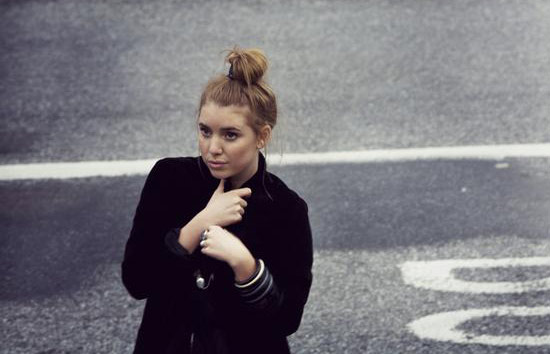
Story Time
by Kevin J. Elliott
A lot can happen in six months. Just ask Lykke Li. The 21-year-old torch singer made her American debut doing 11 shows in three days at this year’s South By Southwest festival in Austin, sweating and schmoozing for her supper with only an oddball name and the brief but dynamic history of her homeland’s pop to hang her kazoo on. Now, with her stunning full-length debut, Youth Novels, finally released in the States, she’s jet-setting between giant festivals throughout Western Europe and photo shoots in Manhattan.
Hers is a star rising, but not without growth along the climb, both in confidence and songwriting chops. Youth Novels is dark and eccentric minimalist pop: in her voice the otherworldly coo of Bjork, in her funky cadence the peppering of hip-hop and nursery rhyme, in the songs a surgical focus and crystalline sheen that stems from her Scandinavian brethren.
I recently caught up with her on one of her frequent trips to New York and found that despite the long rift between the creation of her debut album and its eventual release upon the rest of the world she’s been as busy and driven as ever.
I guess first of all, what are you doing in New York right now? You’re not on tour here, but all summer you’ve been back and forth between Europe and Manhattan.
Lykke Li: I’m doing secret gigs. Last night we did a gallery party and then on Wednesday I’m doing a magazine party. We’re recording. I’m doing some fashion shoots and lots of other stuff.
Is it safe to say that you prefer New York right now?
LL: Well I still love Sweden, but yes, right now I love New York. My heart is still in Sweden, though.
It’s taken quite a while for Youth Novels to be released in North America. Before that it has been nominated for Swedish Grammies and you’ve played a number of shows in America to promote it. Are you at all tired of the songs on that album?
LL: This is a really different position for me because I always want to keep on going. Ike and Tina Turner, though, they went and toured the same songs for years. Right now I’m a performer and that’s what I have to do right now. I have to get into that role. I’m constantly focusing on finding new angles in the songs and sharpening the stage show. It’s tiring and it’s a struggle, but it’s never boring.
The name Youth Novels suggests you’re very literary, and that this record is supposed to follow a narrative of some sorts. If you could encapsulate this novel in a sentence what would it be?
LL: It would be subtitled “Solitude in Stockholm.”
Anyone who’s only seen the videos or witnessed you live would know that dance is a huge part of your aesthetic. I’ve read you’re a former dance student. Is the dancing something you consider very important when trying to promote yourself? Is that natural or an element you wanted in your music?
LL: Everyone thinks just because I took some ballet lessons as a kid that I’m a dancer and that I have routines. I don’t. I’m not a dancer. I just go with the set and just dance however I feel like. So it’s nothing planned or practiced in front of the mirror. After I quit dancing, I didn’t dance for years because I was so fed up with it. It’s a totally different aspect of dance that I do now; I just feel it and just sort of move, like Elvis Presley.
You’re a bit of a nomad. How has that influenced your songwriting?
LL: Well, when I was making the record I was back and forth, but it was nothing like it is now. I was pretty much stuck in Stockholm figuring out what to do with my life. You don’t have any money, you don’t have any education, blah, blah, blah, and you’re just stuck in Stockholm dreaming about being a nomad. Of course during my childhood I traveled a lot, but I was always in school so most of the time I was in Stockholm. We did live in Portugal for five years and I did spend my summers in New York after school, but it was nowhere near what people think. Now it’s insane, it’s back and forth every day.
You’re being bundled in with the whole Swedish pop movement, and there was an article recently that talked about how the government there gives grants to nurture the music community. Was this true for you?
LL: What the fuck? Where does that happen? I don’t know one fucking person who got a grant. They give it to jazz musicians and classical artists, but not to pop music. I guess they might do that for pop artists, but I don’t know anyone who got it.
It does, though, seem like a lot of this Scandinavian pop is manufactured. But you’re different because you’re doing it all by yourself. So where, as a songwriter, did you get the most inspiration?
LL: I get it from things in my life that have happened. I’m just trying to understand who I am. Why am I this way? Why am I so shy? Why am I so weird? Once I make sense of who I am, I write about it.
You have claimed that you want to be the next Madonna. Can you elaborate more on that statement?
LL: No! Where did you read that? This is getting out of control. I think I may have said that when I was seven. There’s nothing wrong with Madonna, but I do not want to be her. I don’t want to be the next anybody. I just want to be—I don’t know—crazy. I want to be free. I want to be Patti Smith or Vashti Bunyan. I’ll just do two records and then disappear.
You said you’ve been recording in New York, so do you have a sense of what you’re next record is going to sound like?
LL: Definitely. I want it to be raw and to be dark. I’m trying to make it more like the live show. Now I’ve learned how to sing, so I want to use that. Before I couldn’t sing. I was horrible.
I know you’ve been doing a Tribe Called Quest song live, and it seems that hip-hop has a big influence on your music. So if you had a hip-hop name what would it be?
LL: Well I’ve already got the LL, so I’ll just steal the Ladies Love from LL Cool J.
